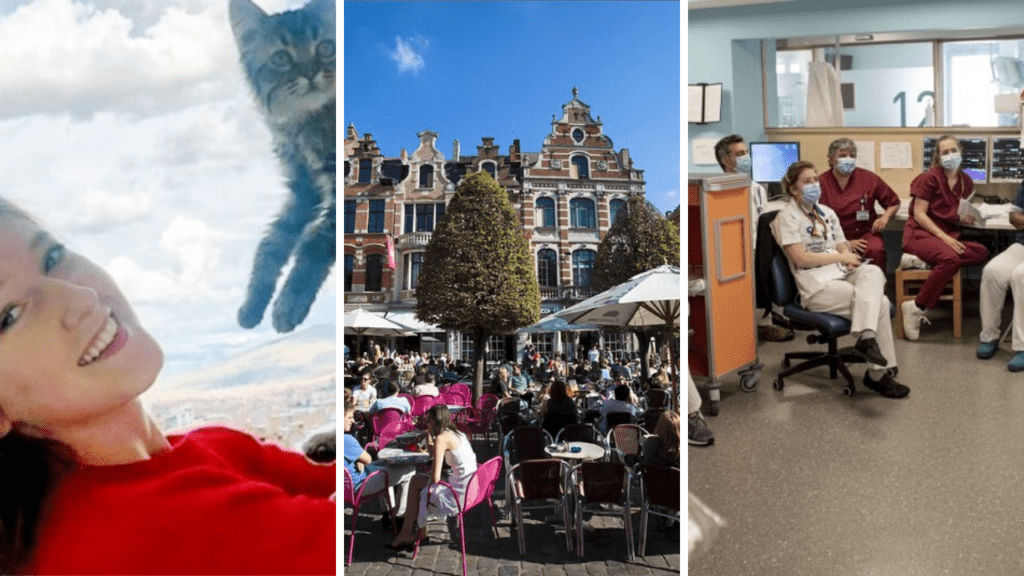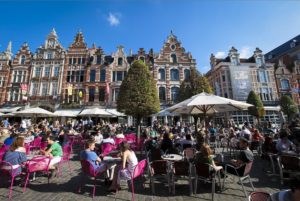After the weekend brought some brief hope that we could go out for a beer from next Wednesday, the latest official communication suggests that we will have to wait until at least 8 June after all.
Statements by Interior Minister Pieter De Crem caused a stir on Sunday, as he seemed to consider the possibility of reopening café terraces before 8 June, the date set for phase 3 of the deconfinement.
However, the first possible date is and remains 8 June, Federal Minister for Economy Nathalie Muylle clarified on Wednesday, saying that nothing signalled to the possibility of an earlier date.
The minister said she was aware that the sector needs to know the conditions for its revival well in advance. Even if there are stages, they want a comprehensive plan that gives prospects to the whole sector.
So what's the other news of the day? Peru has removed the last hope for cat Lee, a Brussels sex worker hotel reopened briefly, and -as always- the latest figures.
With so much information, and so little time to catch up before it potentially changes again, here are some of the top stories from around the country to get you up to speed.
Belgium in Brief is a free daily roundup of the top stories to get you through your lunch break conversations. To receive it straight to your inbox every day, sign up below:
1. 257 new infections, 47 hospital admissions in Belgium
257 additional people have tested positive for the new coronavirus (Covid-19) in Belgium in the last 24 hours, according to figures by the Federal Public Health Service on Thursday.
This brings the total number of confirmed cases in Belgium, since the beginning of the pandemic, to 57,849. The total reflects all people in Belgium who have been infected, and includes confirmed active cases as well as patients who have since recovered, or died from the consequences of the virus.
143 of the newly-infected people live in Flanders, 86 live in Wallonia, and 28 live in Brussels. Read more.
2. Hospitality sector draws up plan for reopening restaurants and bars safely
The horeca sector (hotel-restaurant-cafe) has still no information on when it might reopen to serve customers, but the representative organisation for Flanders has drawn up a plan for the occasion.
The main problem for the sector – and the reason why closing restaurants and bars was the first move of the government back in March – is proximity.
Restaurants typically fit in as many tables as they can while allowing for the passage of servers and the comfort of diners. Cafes and bars, meanwhile, group customers around tables or have them lined up three-deep at the bar. Read more.
3. Brussels university will continue online lessons through 2021
The Université Libre de Bruxelles (ULB) will kick off the next academic year in an unprecedented manner in order to reduce risks linked to the coronavirus pandemic.
ULB Dean Yvon Englert said that there would be no “going back to normal” after the summer break, since many uncertainties still remained regarding life after the lockdown. Each week, only one-third of students in each class and in each university year will be able to physically attend class, with the remaining 66% following the lessons live through distance-learning. Read more.
4. Peru removes last hope for wanted cat Lee
The Peruvian health authorities have refused a request to allow the return of a cat illegally imported into Belgium, leaving euthanasia as the only remaining option.
The cat, known as Lee, was brought into Belgium in April by Antwerp student Selena Ali after a visit to Peru. The cat did not have a licence and did not pass through quarantine. According to the federal food safety agency, the import was illegal, and because of the risk of rabies, there was no other option but for the cat to be put down. Read more.
5. Brussels sex worker hotel reopens because of ‘unclear regulations’
A hotel where many sex workers receive their clients briefly opened its doors last week, despite the coronavirus regulations forbidding it, because the rules were not clear.
“We suddenly started seeing a lot more prostitutes and clients in the neighbourhood, the pull effect was immediate,” Jan Leermans of the Alhambra committee said on Radio 2. “As it was not clear if the mayor or the federal government had given permission to reopen the hotels, we called the police,” he said, adding that not long after, the hotel closed its doors again. Read more.
6. Asylum seekers more likely to get rejected by Flemish judges
Francophone immigration judges are nine times more likely than their Flemish counterparts to recognise a request for political asylum, according to new figures by an immigration appeals court.
In its latest report, the Aliens Litigation Council (CCE/RVV) released figures showing “indisputable” differences regarding how the right to asylum is judged on either side of the Dutch-French language border. Read more.
7. An e-scooter rider ends up in the hospital every week
An e-scooter rider is hospitalised on average once per week. None of those who end up in the emergency room were wearing a helmet at the time of their accident.
Head injuries and jaw fractures are the most common injuries resulting from an e-scooter crash, according to a new joint study by road safety institute VIAS and five Belgian hospitals. Read More.
Maïthé Chini
The Brussels Times



